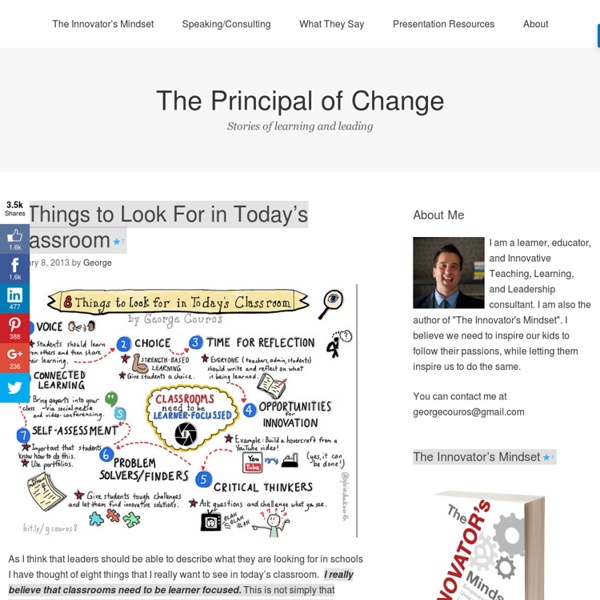Pearson Prentice Hall: eTeach: Strategies for Improving Reading Comprehension
by Patricia Babbitt Introduction Most Effective Strategies Practical Applications of Reading Strategies Summary Resources Remember the adventures that lived and breathed between the pages of a really good book when, as a young reader, you slipped away undiscovered into your own magical world? My favorite works were Charlotte's Web, Arabian Nights, Huckleberry Finn, Arthurian Legends, and, later, the timeless tragedy of William Shakespeare's Hamlet.
Dan Pink: How Teachers Can Sell Love of Learning to Students
By Jennie Rose In his new book To Sell is Human, author Daniel Pink reports that education is one of the fastest growing job categories in the country. And with this growth comes the opportunity to change the way educators envision their roles and their classrooms.
Christchurch Connected Educators: Choose to be More at Clarkville
What’s it taken to CHOOSE TO BE MORE at Clarkville? From Pene Abbie, Principal, Clarkville School We are a small, semi-rural school on the outskirts of Christchurch, people used to say they wanted to send their children to our place because of this – being small and rural! It seemed that these two traits immediately determined a culture of great learning. Those of us on the inside knew it took more than this and we have spent the last seven years “reshaping our learning culture.” So what does this mean – and why, if our learners are doing pretty well, would we want to do anything differently?
Reflecting on Reflection: A Habit of Mind
Reflection is a fundamental tenet of learning, and therefore a fundamental part of teaching. Why it happens is a matter of humility. But how and when it happens -- and with whom -- is less clear. This is partly because there are multiple sides to reflection -- length, width, and depth.
Study Skills Guide: Improve Reading Comprehension Skills
Good reading comprehension comes only with practice. The basic aspects of reading, such as word recognition, phonetics and fluence, can be mastered in just a few years. However, throughout this process reading comprehension must be emphasized. Students may be able to eloquently repeat the words that the see on a page all day, but without reading comprehension skills, they're unable to fully understand the content, predict what will happen next, recognize characters, gain insight or understanding to build upon, or relate what they're reading to their own life's experience. Sadly, classrooms across the United States have students who struggle with reading comprehension.
Manager or Leader: Which Are You?
There has always been an on-going debate on the differences between a leader and a manager. Many have asserted that leaders have followers, while managers have subordinates. Reading numerous articles on management and leadership styles had revealed to me several core differences between the two which would have probably resulted in such a portrayal.
Small Change, Big Impact - Design Thinking in Action, Phase 1 - Matt Ives Matt Ives
This is a write up of an experiment in Design Thinking I recently went through. The task was to make a small change to my learning environment with the aim of positively impacting learning. To jump to the end for a little bit, this process I’ve gone through has been a transformative one. It’s dawned on me, sitting here reflecting after it all, that even the smallest changes can have massive impacts. All it takes is an open mind, a juicy problem, and an eye to action.
Teachers As Researchers: The Power of Mindset
Serena Hicks is an English and language arts teacher and professional development facilitator in West Ada School District, in Meridian, Idaho. Change is hard! In my experience, I’ve noticed that teachers are more likely to make positive changes when they get to decide when and how to change. I used to make changes in my classroom based on intuition - I just know what my students need - but found that intuition alone wasn’t enough to truly spark student learning.
Why Your Students Don't Remember What You Teach -
Why Your Students Don’t Remember What You Teach: The Overwhelming Power Of ‘Place’ In Learning by Terry Heick A decent question: Why don’t your students remember what you’ve taught? A better question: Why don’t they understand what you’ve taught? A better question still: Why don’t students understand and use what they’ve been taught to create a better world?
Elizabeth English: Why So Many Schools Remain Penitentiaries of Boredom
"It's harder to change a school than it is to move a graveyard." Or, as it's also been said, "It's harder to change a history course than it is to change history." I think we can all agree that our schools should be among our most dynamic and innovative institutions; but despite the endless talk about school reform, they remain among our most ossified.
2 reasons to keep the ‘e’ in e-learning
The question comes up frequently in discussions related to using technologies in education: Why do we still have the ‘e’ in ‘e-learning’? Shouldn’t it be just about the learning? And doesn’t the retention of the ‘e’ just perpetuate a short-sighted focus on the tech, not the teach?
John Hattie & His High Impact Strategies
Note, this article refers to John Hattie’s 2009 book, Visible Learning. You can find an updated summary of his findings here. John Hattie synthesized over 500,000+ studies related to student achievement in his book Visible Learning. In this book he showed that teachers can make a difference despite other circumstances that may impede learning.



